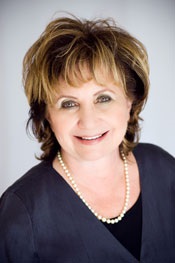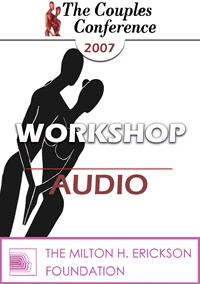CC07 Workshop 04 - Enhancing Relationships - Cloe Madanes, Lic Psic, HDL
- Average Rating:
- Not yet rated
- Topic Areas:
- Workshops | Couples Therapy | Relationships
- Categories:
- Couples Conference | Couples Conference 2007 | Pioneers in Couples and Family Therapy
- Faculty:
- Cloe Madanes, HDL, LIC
- Duration:
- 2:57:57
- Format:
- Audio Only
- Original Program Date:
- Apr 27, 2007
- License:
- Never Expires.
Description
Description: This workshop offers a practical relationship enhancement model rooted in six universal human needs—certainty, variety, significance, love, growth, and contribution. Madanes focuses on healing relational wounds and building stronger partnerships through structured interventions like heartfelt meditation, passion play, and guided dialogue. Case studies, including a couple navigating family tensions and unmet needs, illustrate how addressing past dynamics can renew trust, connection, and resilience across diverse populations.
Syllabus Description: Madanes will present a series of skills, practices and strategies for enhancing relationships. There will be an opportunity for discussion and for practicing some of these skills.
Educational Objectives:
- To list seven master skills in relationships.
- To describe ten practices to enhance relationships.
*Sessions may be edited for content and to preserve confidentiality*
Credits
Handouts
| Timestamped Transcript (602.9 KB) | 12 Pages | Available after Purchase |
| Timestamped Transcript (1.4 MB) | 39 Pages | Available after Purchase |
| Timestamped Tramscript (701.1 KB) | 15 Pages | Available after Purchase |
| Ericksonian Learning Snapshot (246.1 KB) | 2 Pages | Available after Purchase |
Faculty

Cloe Madanes, HDL, LIC Related Seminars and Products
Cloé Madanes, HDL, LIC, is a world-renowned innovator and teacher of family and strategic therapy and one of the originators of the strategic approach to family therapy. She has authored seven books that are classics in the field: Strategic Family Therapy; Behind the One-Way Mirror; Sex, Love and Violence; The Violence of Men; The Secret Meaning of Money; The Therapist as Humanist, Social Activist and Systemic Thinker; and Relationship Breakthrough. She has presented her work at professional conferences all over the world and has given keynote addresses for The Evolution of Psychotherapy Conference, the American Association of Marriage and Family Therapy; the National Association of Social Workers, The Erickson Foundation, the California Psychological Association and many other national and international conferences. Madanes has won several awards for distinguished contribution to psychology and has counseled outstanding individuals from all walks of life.


